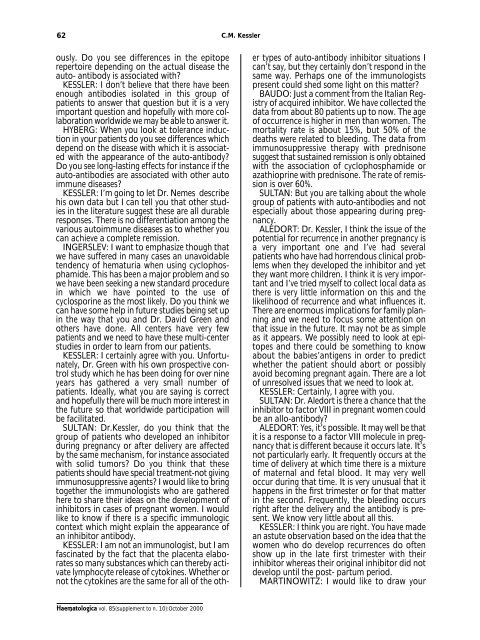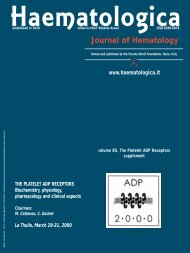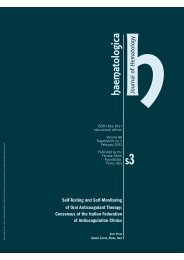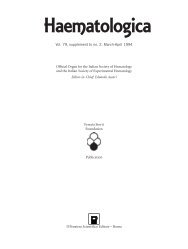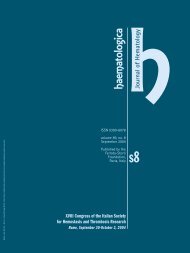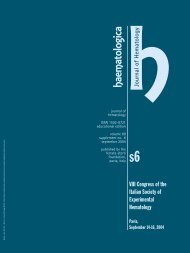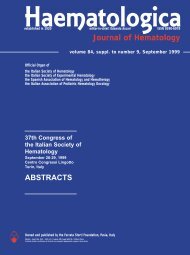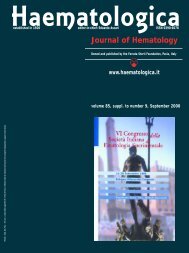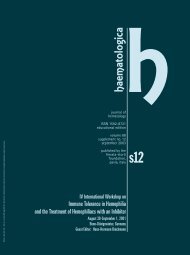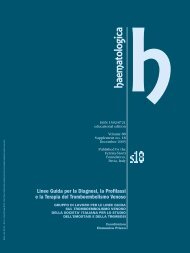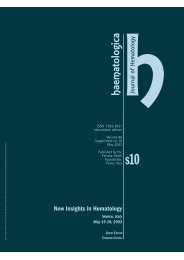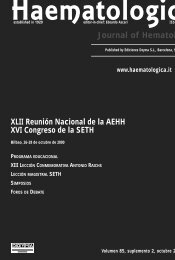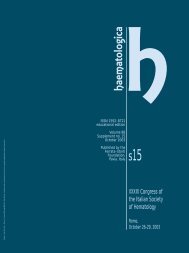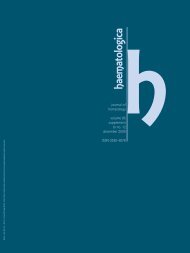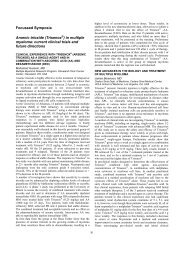Haematologica 2000;85:supplement to no. 10 - Supplements ...
Haematologica 2000;85:supplement to no. 10 - Supplements ...
Haematologica 2000;85:supplement to no. 10 - Supplements ...
You also want an ePaper? Increase the reach of your titles
YUMPU automatically turns print PDFs into web optimized ePapers that Google loves.
62<br />
C.M. Kessler<br />
ously. Do you see differences in the epi<strong>to</strong>pe<br />
reper<strong>to</strong>ire depending on the actual disease the<br />
au<strong>to</strong>- antibody is associated with<br />
KESSLER: I don’t believe that there have been<br />
e<strong>no</strong>ugh antibodies isolated in this group of<br />
patients <strong>to</strong> answer that question but it is a very<br />
important question and hopefully with more collaboration<br />
worldwide we may be able <strong>to</strong> answer it.<br />
HYBERG: When you look at <strong>to</strong>lerance induction<br />
in your patients do you see differences which<br />
depend on the disease with which it is associated<br />
with the appearance of the au<strong>to</strong>-antibody<br />
Do you see long-lasting effects for instance if the<br />
au<strong>to</strong>-antibodies are associated with other au<strong>to</strong><br />
immune diseases<br />
KESSLER: I’m going <strong>to</strong> let Dr. Nemes describe<br />
his own data but I can tell you that other studies<br />
in the literature suggest these are all durable<br />
responses. There is <strong>no</strong> differentiation among the<br />
various au<strong>to</strong>immune diseases as <strong>to</strong> whether you<br />
can achieve a complete remission.<br />
INGERSLEV: I want <strong>to</strong> emphasize though that<br />
we have suffered in many cases an unavoidable<br />
tendency of hematuria when using cyclophosphamide.<br />
This has been a major problem and so<br />
we have been seeking a new standard procedure<br />
in which we have pointed <strong>to</strong> the use of<br />
cyclosporine as the most likely. Do you think we<br />
can have some help in future studies being set up<br />
in the way that you and Dr. David Green and<br />
others have done. All centers have very few<br />
patients and we need <strong>to</strong> have these multi-center<br />
studies in order <strong>to</strong> learn from our patients.<br />
KESSLER: I certainly agree with you. Unfortunately,<br />
Dr. Green with his own prospective control<br />
study which he has been doing for over nine<br />
years has gathered a very small number of<br />
patients. Ideally, what you are saying is correct<br />
and hopefully there will be much more interest in<br />
the future so that worldwide participation will<br />
be facilitated.<br />
SULTAN: Dr.Kessler, do you think that the<br />
group of patients who developed an inhibi<strong>to</strong>r<br />
during pregnancy or after delivery are affected<br />
by the same mechanism, for instance associated<br />
with solid tumors Do you think that these<br />
patients should have special treatment-<strong>no</strong>t giving<br />
immu<strong>no</strong>suppressive agents I would like <strong>to</strong> bring<br />
<strong>to</strong>gether the immu<strong>no</strong>logists who are gathered<br />
here <strong>to</strong> share their ideas on the development of<br />
inhibi<strong>to</strong>rs in cases of pregnant women. I would<br />
like <strong>to</strong> k<strong>no</strong>w if there is a specific immu<strong>no</strong>logic<br />
context which might explain the appearance of<br />
an inhibi<strong>to</strong>r antibody.<br />
KESSLER: I am <strong>no</strong>t an immu<strong>no</strong>logist, but I am<br />
fascinated by the fact that the placenta elaborates<br />
so many substances which can thereby activate<br />
lymphocyte release of cy<strong>to</strong>kines. Whether or<br />
<strong>no</strong>t the cy<strong>to</strong>kines are the same for all of the other<br />
types of au<strong>to</strong>-antibody inhibi<strong>to</strong>r situations I<br />
can’t say, but they certainly don’t respond in the<br />
same way. Perhaps one of the immu<strong>no</strong>logists<br />
present could shed some light on this matter<br />
BAUDO: Just a comment from the Italian Registry<br />
of acquired inhibi<strong>to</strong>r. We have collected the<br />
data from about 80 patients up <strong>to</strong> <strong>no</strong>w. The age<br />
of occurrence is higher in men than women. The<br />
mortality rate is about 15%, but 50% of the<br />
deaths were related <strong>to</strong> bleeding. The data from<br />
immu<strong>no</strong>suppressive therapy with prednisone<br />
suggest that sustained remission is only obtained<br />
with the association of cyclophosphamide or<br />
azathioprine with prednisone. The rate of remission<br />
is over 60%.<br />
SULTAN: But you are talking about the whole<br />
group of patients with au<strong>to</strong>-antibodies and <strong>no</strong>t<br />
especially about those appearing during pregnancy.<br />
ALEDORT: Dr. Kessler, I think the issue of the<br />
potential for recurrence in a<strong>no</strong>ther pregnancy is<br />
a very important one and I’ve had several<br />
patients who have had horrendous clinical problems<br />
when they developed the inhibi<strong>to</strong>r and yet<br />
they want more children. I think it is very important<br />
and I’ve tried myself <strong>to</strong> collect local data as<br />
there is very little information on this and the<br />
likelihood of recurrence and what influences it.<br />
There are e<strong>no</strong>rmous implications for family planning<br />
and we need <strong>to</strong> focus some attention on<br />
that issue in the future. It may <strong>no</strong>t be as simple<br />
as it appears. We possibly need <strong>to</strong> look at epi<strong>to</strong>pes<br />
and there could be something <strong>to</strong> k<strong>no</strong>w<br />
about the babies’antigens in order <strong>to</strong> predict<br />
whether the patient should abort or possibly<br />
avoid becoming pregnant again. There are a lot<br />
of unresolved issues that we need <strong>to</strong> look at.<br />
KESSLER: Certainly, I agree with you.<br />
SULTAN: Dr. Aledort is there a chance that the<br />
inhibi<strong>to</strong>r <strong>to</strong> fac<strong>to</strong>r VIII in pregnant women could<br />
be an allo-antibody<br />
ALEDORT: Yes, it’s possible. It may well be that<br />
it is a response <strong>to</strong> a fac<strong>to</strong>r VIII molecule in pregnancy<br />
that is different because it occurs late. It’s<br />
<strong>no</strong>t particularly early. It frequently occurs at the<br />
time of delivery at which time there is a mixture<br />
of maternal and fetal blood. It may very well<br />
occur during that time. It is very unusual that it<br />
happens in the first trimester or for that matter<br />
in the second. Frequently, the bleeding occurs<br />
right after the delivery and the antibody is present.<br />
We k<strong>no</strong>w very little about all this.<br />
KESSLER: I think you are right. You have made<br />
an astute observation based on the idea that the<br />
women who do develop recurrences do often<br />
show up in the late first trimester with their<br />
inhibi<strong>to</strong>r whereas their original inhibi<strong>to</strong>r did <strong>no</strong>t<br />
develop until the post- partum period.<br />
MARTINOWITZ: I would like <strong>to</strong> draw your<br />
<strong>Haema<strong>to</strong>logica</strong> vol. <strong>85</strong>(<strong>supplement</strong> <strong>to</strong> n. <strong>10</strong>):Oc<strong>to</strong>ber <strong>2000</strong>


